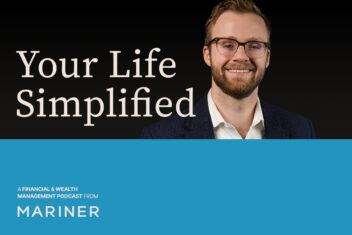Strategies to Help Manage Risk

When it comes to reaching your goals— retiring early, buying a second home, paying for your child’s college, travel—one factor could derail your asset accumulation and preservation goals like no other: risk. Learn how to navigate five common risks as you work toward achieving your goals.
Strategies to Mitigate Risk
You might primarily think of risk as being too aggressively invested then watching the market take a swift downturn. But it’s so much more than that.
Five Risks to Your Investment Goals
- Inflation
- Taking withdrawals from retirement accounts during a market downturn
- Being too conservative with your long-term investing strategy
- Unexpected health care costs
- Outliving your retirement savings
Inflation Can Threaten Cash Flow
Although inflation rates have fallen from a 40-year high in 2022 to close to the Federal Reserve’s target long-term average inflation rate of 2%, over time, inflation can erode the value of your investment portfolio.
So, what can you do to combat inflation? A starting point is to meet with your wealth advisor to review your asset allocation to ensure you have appropriate growth investments in your portfolio to help outpace inflation.
You’ll also want to factor the impact of inflation into your retirement account withdrawal strategy.
Bad Timing Can Affect Lifetime Savings
As you start to withdraw money from your retirement accounts, you could experience sequence of return risk. This refers to the markets generating a sequence of negative returns over several years at the same time you begin to take withdrawals. This risk may result in you not having enough savings to last throughout your retirement. If you find yourself in this position, take a closer look at your cash flow and see where you could reduce discretionary spending until the market levels out.
Meet with your wealth advisor to review historical returns and “stress test” your portfolio to factor in different volatility scenarios so you can better prepare a withdrawal strategy in anticipation of potential future market uncertainty.
Being Too Conservative Can Impact Long-term Savings
As you age and near retirement, your portfolio allocation should become more balanced in terms of including equities for growth and bonds for capital preservation. The danger lies in tilting your portfolio too far to the conservative side. Whether you’ve been spooked by market corrections or just have a low tolerance for risk, you still need a growth component in your portfolio to help combat inflation as mentioned above. Growth doesn’t mean taking unnecessary risks—it just means developing a strategy to balance growth and asset preservation to help ensure you can still reach your goals.

Plan for Unexpected Health Care Costs
The fact of the matter is that every day until 2030, 10,000 baby boomers will turn 65 and of those, 70% will need long-term care at some point.1
The cost of long-term care has risen dramatically over the years. For example, in 2023, the annual median cost of a private room in a nursing home was $116,800, a year-over- year increase of nearly 5%.2 It’s a good idea to expect to need some level of care as you age and work with your wealth advisor on the best way to fund it. Some may choose to fund it out of their overall savings, while others may choose to purchase long-term care insurance or a new, permanent life insurance policy with a long-term care rider to defray some of the costs.
Outliving Your Retirement Savings
The worry that you could outlive your retirement savings is a common one. Not surprisingly, a 2023 retirement confidence survey found that only about two-thirds of workers are confident in having enough money to live comfortably in retirement.3 Across generations, many Americans believe the U.S. faces a retirement crisis and plan to work longer and cut their spending now and in retirement to help ensure their savings last. Other strategies include making sure you max out your retirement plan contributions and take advantage of catch-up contributions if you’re age 50 or older, as well as delaying receiving Social Security to receive a higher monthly benefit over time.
Consult With Your Wealth Advisor
As you contemplate these risks to your ability to accumulate and preserve assets, it’s a good idea to meet with your wealth advisor. At Mariner, your wealth advisor has access to an in-house team of specialists covering everything from taxes, insurance, trusts and estate planning. Together, they’ll work with you on a wealth plan designed to mitigate risk to help you reach your short- and long-term goals.
Sources:
1,2“Genworth Cost of Care Survey”
3“2023 Retirement Confidence Survey”
This material is provided for informational and educational purposes only. It does not consider any individual or personal financial, legal, or tax circumstances. As such, the information contained herein is not intended and should not be construed as individualized advice or recommendation of any kind. Where specific advice is necessary or appropriate, individuals should contact their professional tax, legal, and investment advisors or other professionals regarding their circumstances and needs.
Any opinions expressed herein are subject to change without notice. The information is deemed reliable, but we do not guarantee accuracy, timeliness, or completeness. It is provided “as is” without any express or implied warranties.
There is no assurance that any investment, plan, or strategy will be successful. Investing involves risk, including the possible loss of principal. Past performance does not guarantee future results, and nothing herein should be interpreted as an indication of future performance.
Mariner is the marketing name for the financial services businesses of Mariner Wealth Advisors, LLC and its subsidiaries. Investment advisory services are provided through the brands Mariner Wealth, Mariner Independent, Mariner Institutional, Mariner Ultra, and Mariner Workplace, each of which is a business name of the registered investment advisory entities of Mariner. For additional information about each of the registered investment advisory entities of Mariner, including fees and services, please contact Mariner or refer to each entity’s Form ADV Part 2A, which is available on the Investment Adviser Public Disclosure website. Registration of an investment adviser does not imply a certain level of skill or training.

